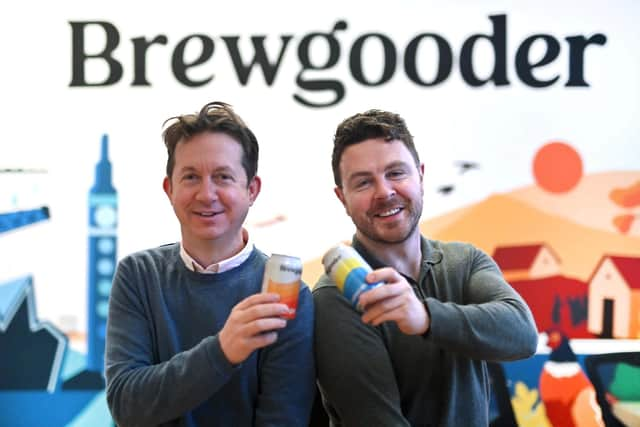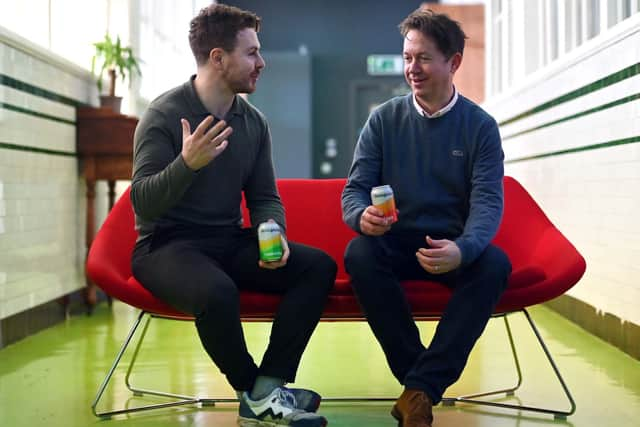Cheers! How Brewgooder's entrepreneurial founder and corporate veteran MD teamed up to turbocharge its ambitions
Alan Mahon
During the pandemic, Brewgooder co-founder James Hughes and I both turned 30, and we’d built the firm up as a brand over the previous five years.
We did a good job of that from a brand-recognition point of view, but we'd always thought we needed to find somebody with experience, maturity… stuff that could really allow us to do what we do well, but actually run a good business.
Advertisement
Hide AdAdvertisement
Hide AdAnd one of the roles we thought was quite a departure for us was managing director, so we advertised for that, and Damon was the candidate that stood out. A lot of people when they come to Brewgooder, especially if they're experienced, tend to think they want to give back in their career.
But Damon was the only person that genuinely saw the future for the brand the same way we did. It was clear that he had the drive, the energy, the warmth, and so we took him on in an interim, part-time capacity starting in February last year. It went so well it became permanent and full time.
Since he started we've changed our business model, so rather than giving 100 per cent of our profits to fund clean water and sanitation projects in developing countries, we've changed it to 100 times the volume of beer we sell being provided in clean water in relevant locations.


It means that as we expand, we can actually finance the growth of the company, so we've become much more like a traditional business. We haven't sacrificed any of our principles, we've just actually found a better way to do it that will make an even bigger impact.
It's the way for me to maximise the purpose-driven element – how can I make as many positive things happen just by selling beer, that is genuinely how I view my role within the organisation – and it’s nice to be recognised with things like this week’s news that I’m one of the Scottish finalists in this year's EY Entrepreneur Of The Year awards.
I’ve tried to build Brewgooder as a brand from the name down to the styles of beer, to how we do the impact side of things as something that can be scaled across the UK. But I also think it can thrive in, say, California, Sydney and Vancouver as much as it does in Portobello in Edinburgh and the south side of Glasgow.
We don't want to imitate anyone else and these days businesses are started with purpose as a core aspect of what they do. We were just quite lucky in going early in that journey – and I think now, more established beer brands are trying to look a lot more like us than we are like them.


As for my working relationship with Damon, I don't consciously say "this is my mentor, I’m going to bring him problems to solve as a wizened head” – it’s not formal in that way.
Global perspective
Advertisement
Hide AdAdvertisement
Hide AdWhat he brings is a wealth of experience from having done it – and done it very, very successfully – and a global perspective. There's a whole market view Damon has that I don't have, because I'm so obsessed with the granularity of our own business in many respects.
One of the things I love about working with Damon is that he's constantly encouraging me to think about things from a different point of view.
We’ve worked through issues around loads of things I could have made calls on that could have gone right or wrong. I can draw on his experience that puts things in perspective – it allows me to learn a lot informally.
I've done this for about six years now, but certainly the last 14 months have been a particular highlight. A lot of that is down to Damon, and I’m sure he'll blush when I say that. For me, like a lot of people I know, you’re young and have the vision, but not the experience – and I’ve made mistakes.
Working with or simply getting advice from someone senior who has been there and done it and has made the mistakes on your behalf means you can learn more quickly from that and better drive your own vision.
Scotland’s such a small place – you're probably not more than two degrees of separation from somebody who can help you, whether it's an employment issue, or somebody who cares about your vision and wants to see you succeed. I think asking for help is always better than not.
Damon Swarbrick
Edinburgh born, I’m in my late 40s and I've worked at several large multinationals including PepsiCo, McVitie’s, and Edinburgh-based Scottish & Newcastle – now Heineken UK following its acquisition in 2008.
When I was 35 my family and I moved south when I became chief executive of the European arm of Kingfisher Beer. I continue to live in the south of England and now commute to Glasgow twice a month to work alongside Alan and the team at our head office.
Advertisement
Hide AdAdvertisement
Hide AdDuring my 11 years at Kingfisher we enjoyed tremendous commercial success, but I reached the point where I wanted a fresh challenge. In February 2020 I resigned my position and planned to have a bit of time off, and then get back into work when the right opportunity arose. My decision to leave Kingfisher couldn’t have been timed worse as due to the pandemic I was thrust into homeschooling our children!
By the time I met Alan and fellow Brewgooder co-founder James in January 2021 I already had a series of consultancy projects, so we agreed that I would work three days a week on task-driven, project-based assignments.
It mushroomed from there, really, we learned about everyone’s preferred way of working and it just felt like really good chemistry. I saw that the business had huge potential.
After nine months in a consulting role for Brewgooder I was offered the role of managing director and I started full time in November last year.
Working alongside a business-owner and founder of a fledgling, high-potential company is a very different experience and environment to what I had become accustomed to.
I had the classic corporate training, whereas Alan left university and built something, but underpinning the success of our working relationship is mutual respect, strong personal chemistry, and a clear understanding of where I can add value.
From the beginning of our working relationship, I’ve tried not to step on the toes of both the founders – they’ve done a hugely successful and impressive job in building the business and placing Brewgooder at the forefront of the next generation of craft beer brands. From day one, identifying where those departmental gaps exist and building our capabilities in these areas has been of paramount importance.
During my four years at McVitie’s, I was supported, mentored and coached on a daily basis by my very talented line manager whose personal attention transformed my career. Since that period I have always tried to instil some of those behaviours with all my colleagues and team members.
Time off
Advertisement
Hide AdAdvertisement
Hide AdWhen I started I made a commitment to Alan that “within a couple of months, my aim is for you to go on holiday for two weeks, turn your phone off, and trust us that we'll run it” – he hadn’t done that since he’d started Brewgooder in 2016.
Historically, coaching and mentoring business-owners has usually been a service provided by independent, qualified coaches that are not involved in the day-to-day running of the company, and are instead involved in improving the individual to become more effective.
I think what we've got here at Brewgooder is a unique blend of working on the business, mentoring the individual, and bringing tangible industry experience – it’s a special combination and a bit of a three-card trick.
From inception, Brewgooder was a brand created to improve people’s lives, and we continue to focus on that core purpose in everything that we do. The whole team passionately believes in the model of purpose-driven businesses where our behaviour and our actions every month make a difference.
During a time when more established brands are retrospectively fitting corporate purpose and looking to “greenwash” their organisation we know from day one that this was always core to our DNA.
I am extremely optimistic about the future of Brewgooder we are on track to be three times bigger than we were in 2020, and both March and April have been record-breaking. Our success is underpinned by building a talented team working on a brand that has a unique role in the market.
By 2025, I would expect us to have created a further 15-plus jobs in Scotland and made a lasting impact on the lives of a lot of people through the work of the Brewgooder Foundation – a charity working to empower people using the power of beer including clean water projects.
Comments
Want to join the conversation? Please or to comment on this article.
